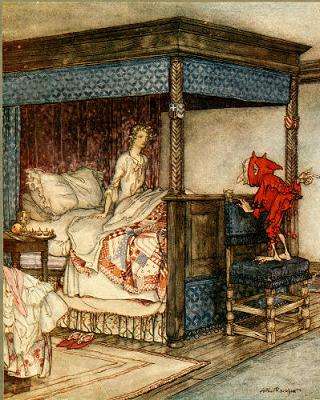Child Ballad

Has nothing to do with children.
In the late 19th century, Harvard professor Francis James Child was concerned that the tradition of folk songs in the British Isles was endangered--songs were dying out, unrecorded. He made it his personal mission to collect as many traditional folk songs as he could from England and Scotland. (Including Ireland, he felt, was way too ambitious a goal. He was right. Ireland has its own folk tradition, which is still active, with new ballads for major political events and new stories up to the present day.)
He got about 300 of them, not including variants; many of the ballads have a dozen variants, or more, and most have several. Even today, ballads are often referred to by the numbers Child assigned them. See here for the full text of The English and Scottish Popular Ballads.
They range, as ballads often do, from Fairy Tales in verse form all the way through to accounts of historical events, with historical characters, perhaps a little refined for story form. Many are recognizably popular forms of medieval Chivalric Romances.
Many of them are heavy on dialect, especially the Border Ballads, those collected on the English-Scottish border. Metrical considerations means that using standard English often requires a total rewrite. This also helps keep the number of Evil Matriarchs high; unlike a Fairy Tale, you can not merely Bowdlerise her into a Wicked Stepmother, because the terms change and no longer fit the meter. A Wicked Stepmother appears in different ballads than the Evil Matriarch.
Many Murder Ballads are Child Ballads. Robin Hood has so many that Child lumps them all together in their own volume.
- "Tam Lin" (#39)
- "Thomas the Rhymer" (#37)
- Abhorrent Admirer: "Kemp Owyne" (Child #34), "Alison Gross" (Child #35)
- All Girls Want Bad Boys: Several, including "Black Jack Davey" (Child #200)
- Bed Trick
- Bride and Switch
- Brother-Sister Incest
- Came Back Wrong: Above all else, never kiss a ghost in a ballad.
- Cycle of Revenge
- Damsel in Distress
- Death by Childbirth
- Death by Sex: very common.
- Dude in Distress
- Downer Ending: Many ballads play this trope straight, others have endings that would have been considered happy in days past, but fall short of the mark by today's standards. Some "happy endings" are pretty horrific to modern audiences.
- Ballad 110, wherein we learn that if a young woman is raped and the perpetrator is single, she will be forced to marry her rapist, whether she wants to or not.
- Due to the Dead
- Engagement Challenge
- Even the Guys Want Him: "Willie O'Winsbury" (Child #100)
- Evil Matriarch
- The Fair Folk
- Family-Unfriendly Death
- Family-Unfriendly Violence
- Flower Motifs
- Gold Digger
- Hair of Gold: Always as "yellow hair" as in "Tam Lin" (Child #39).
- Impossible Task: "Scarborough Fair" (Child #2) is pretty much the Trope Codifier.
- Infant Immortality: Often averted quite gruesomely, especially in "Lamkin" (Child #93) .
- I Will Wait for You
- King Arthur
- Law of Inverse Fertility: Unmarried women become pregnant very easily.
- Love Hurts
- Love Martyr
- Malicious Slander: You can actually die of this, in ballads.
- Mama's Baby, Papa's Maybe: In "Gil Breton", the child's birth comes with magical affirmation of his paternity, to avert this.
- My God, What Have I Done?
- Offing the Offspring: "The Cruel Mother" (Child #20), "The Maid and the Palmer" (Child #21)
- Our Ghosts Are Different: Though, in ballads, it's always a bad idea to be in love with a dead person, they're not necessarily evil per se. Ghosts and other revenants can pop up to drive their killers crazy ("The Cruel Mother", Child #20), or just to say goodbye ("Sweet William's Ghost", Child #77; "The Wife of Usher's Well", Child #79).
- Parental Abandonment
- Parental Marriage Veto: Very common.
- The Promise
- Ravens and Crows: Several ballads, but most especially "The Three Ravens" and its more cynical variant, "The Twa Corbies" (both are Child #26).
- Recycled in Space: Some ballads are clearly variants of older stories--"King Orfeo" (Child #19), for instance, is a retelling of the Greek myth of Orpheus and Eurydice. With Fair Folk.
- Robin Hood: All of Book V, or ballads #117-154.
- Secret Test of Character: Lovers are very fond of this, feigning poverty, or their own deaths, to discover whether the other really is in love with them.
- Sibling Triangle: the sister's motive in "The Twa Sisters"
- Standard Hero Reward: e.g. "The Golden Vanity" (Child #286) SUBVERTED TO THE MAX!!! The hero is told this is the reward, if he drills holes in the enemy man-o'-war, which he does (In a horribly poetic way: He let the water in, and it dazzled in their eyes, and he sunk them in the Low Lands Low.) He is then betrayed by the captain and is abandoned to drown in the ocean. Standard Hero Reward be damned!
- Stock Puzzle: e.g. "Riddles Wisely Expounded" (Child #1), "Captain Wedderburn's Courtship" (Child #46)
- Star-Crossed Lovers
- Sweet Polly Oliver
- Together in Death: "Fair Margaret and Sweet William" (Child #74); some variants of "Barbara Allen" (Child #84).
- Victim Falls For Rapist
- Voluntary Shapeshifting: Evil shapeshifters will often have a Red Right Hand (e.g. "The House Carpenter", Child #243). Good shapeshifters are rare, but see "The Great Selkie of Sule Skerry" (Child #113).
- Wicked Stepmother
- A Year and a Day: In "The Unquiet Grave" (Child #78)
- Youngest Child Wins: Sometimes played straight, sometimes subverted: in "The Twa Sisters" (Child #10), the elder kills the younger.
- Your Cheating Heart: Combines well with Death by Sex.
Those interested in a more thorough and detailed discussion might wish to check out this post and comment thread.